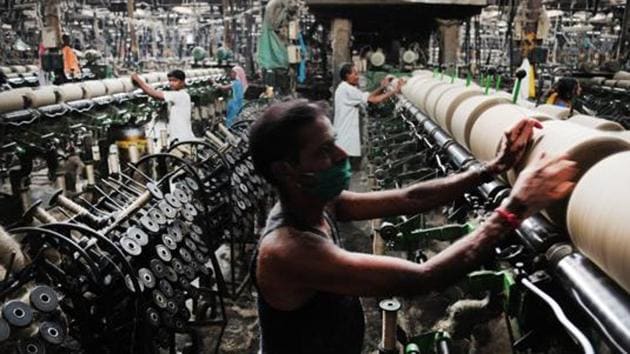Lockdown 2.0: Bengal allows jute mills to operate with 15% labour, industry says unsustainable
The decision came after Bengal received requests from Centre, Maharashtra and Telangana to avert shortfall of gunny bags in procurement season.
The West Bengal government on Wednesday decided to allow the jute industry to operate with 15 per cent of its regular workforce during the lockdown after several requests from the Centre.

Industry captains, however, said that most mills would be unwilling to start operations because working with 15 per cent of the workforce would mean higher losses than keeping the mills shut. They also apprehend law and order problem among workers over choosing this small number from among them.
On Wednesday, chief minister Mamata Banerjee said, “I have received a call from union textile minister Smriti Irani and also from Maharashtra and Telangana, requesting that the mills be allowed to operate. The harvest season in our state has approached too. If we don’t allow operations now, plastic may take up jute’s place.”
Follow coronavirus latest updates here.
However, while Irani in a letter to the chief minister on April 13 had requested to allow at least 18 jute mills – the letter had also named the 18 mills identified by the ministry – with 25 per cent of their regular workforce, Banerjee on Wednesday allowed all mills to operate.
“It will be injustice to allow only 18 mills to operate. So, we are allowing all the mills, with 15 per cent of their regular workforce on alternative days, given that they maintain all protocols, including social distancing and wearing of masks and use of hand sanitizers,” the chief minister said.
The mills have been shut since the lockdown was announced last month.
Bengal has 60 jute mills that directly employ about 200,000 people. Mills on average employ 3,000 people. Hastings Jute Mill in Hooghly district, for example, has 4,338 workers on its roll.
Industry captains said running mills with only 15 per cent of the workforce is not sustainable. “We are waiting for the written communication from the state government but we can say that mills would run into losses if they are to work with only these much of the workers, as the tariff for our main produce gunny bags is fixed,” said Raghavendra Gupta, chairman of Indian Jute Mills Association.
According to the owner of a jute mill, 15 per cent workforce is required only for maintenance purpose. “The cost of running the mills and paying wages would be far higher than the income from the produces, as very little amount of production would ultimately take place,” said a jute mill owner who did not want to be identified.
Another mill owner said, “Nearly 80 per cent of a mills’ workforce live in the vicinity. Choosing only 15 per cent from among them could lead to law and order troubles.”
A senior labour department official, however, ruled out the apprehension of law and order problem. “When chief minister said ‘every alternate day’, she meant the workforce, not functioning of the mills. So, in effect, 30 per cent of the workers would be engaged, each getting work every alternate day.”
Earlier, after the Centre had received requests from the governments of Punjab and Telangana as well as FCI for urging Bengal to let the mills start operation immediately, E K Majhi, additional secretary in the Union ministry of consumer affairs, food and public distribution wrote to West Bengal chief secretary, stating that “It is of utmost importance that jute mills immediately resume their operations for manufacturing/dispatch of jute bales to meet the requirements of the State Procurement Agencies/FCI.”
“I shall, therefore, earnestly request your indulgence to direct jute mills to immediately start manufacturing/supply of jute bales so that during the peak procurement period, procurement operations of government are not disrupted due to a shortage of jute bags,” the letter said.
Bengal had then turned down the Centre’s request, with chief secretary Rajiva Sinha, saying that the state would not act on the basis of a letter from the textile ministry when the lockdown was announced by the Union home ministry.
On Wednesday, the state government also allowed brick kilns to function with 15 per cent of the workforce, work under the Mahatma Gandhi National Rural Employment Guaranty Act, work for housing scheme for the poor and small industrial clusters ‘on case to case basis’. The government has already allowed the tea gardens to operate with 15 per cent of the workforce.
Banerjee said that in every sector workers will have to follow social distancing and use masks and hand sanitisers.
According to the state’s bulletin published on Wednesday, the number of active Covid-19 cases stood as 137. The Union ministry of health and family welfare (MHFW) put the cumulative number of people testing positive for Covid at 213. Seven persons have died and 37 have recovered or have been released, the MHFW said.





